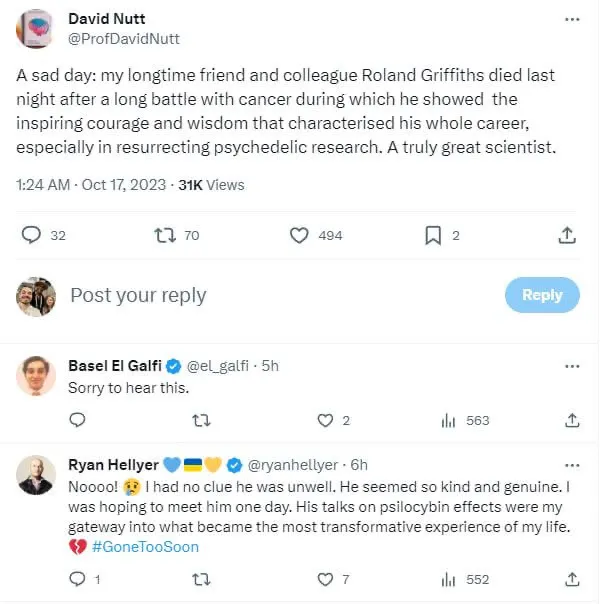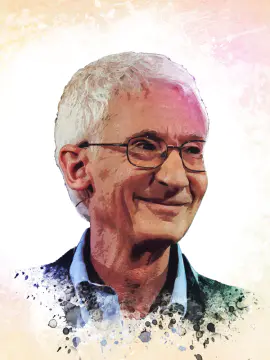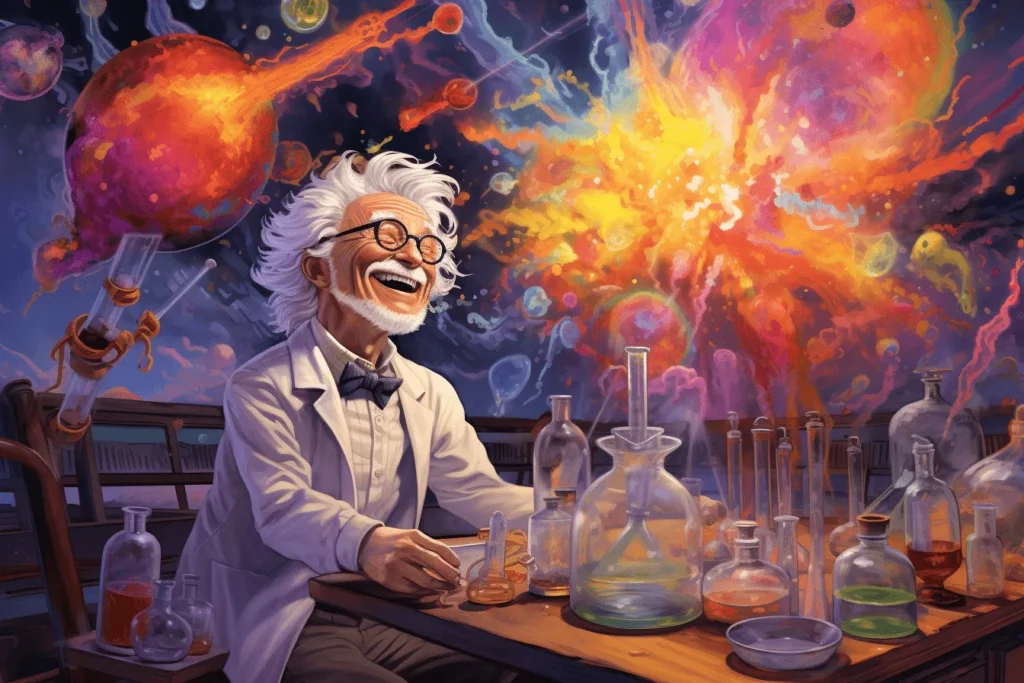T
oday, the psychedelic movement mourns the loss of Dr. Roland Griffiths, a renowned neuroscientist and a leading figure in the field. Dr. Griffiths, a psychopharmacologist at Johns Hopkins University, helped revive psychedelic medicine research, particularly involving psilocybin. His close friend and colleague Dr. David Nutt confirmed Dr. Griffiths’ death. Dr. Griffiths had long been battling terminal cancer, yet during speaking events and in person, Dr. Griffiths always projected an air of quiet strength, hope, and resilience.


Dr. Griffiths was a distinguished neuroscientist and psychopharmacologist whose profound contributions to psychedelic research left an indelible mark on the field. Born on July 19, 1946, his work fundamentally reshaped our understanding of the therapeutic potential of psychedelics, particularly psilocybin, the active compound found in magic mushrooms. Dr. Griffiths’ pioneering research and dedication to expanding our knowledge of these substances made him a pivotal figure in the psychedelic community.
Throughout his career, Dr. Griffiths secured significant research funding from the National Institute of Health and published over 400 journal articles and book chapters. He mentored over 50 postdoctoral research fellows and provided consultancy services to the NIH and pharmaceutical companies. He also served on the Expert Advisory Panel on Drug Dependence for the World Health Organization.(1)
A True Psychedelic Explorer

In 1999, Dr. Griffiths embarked on a groundbreaking journey by conducting the first clinical trial involving psilocybin in decades. This endeavor marked a turning point in the field of psychedelic research, as it reintroduced a substance that had long been sidelined due to regulatory and societal pressures. His research encompassed a wide range of investigations, including studies with healthy volunteers, individuals exploring meditation, and even religious leaders, all aimed at comprehensively understanding the effects of psilocybin.(1, 2)
Keep Up with Psychedelic Trends
Don’t miss the latest psychedelic news, events, companies, and more.
We respect and protect your privacy. By subscribing your info will be subject to our privacy policy. Unsubscribe easily at any time
In the study mentioned above, Dr. Griffiths and his colleagues explored the effects of psilocybin on healthy volunteers, subjecting them to a carefully structured and supervised psychedelic experience. The trial involved a range of psychological and physiological assessments, including measures of emotional well-being, mystical experiences, and changes in perception. What set this trial apart was its meticulous attention to safety, ethics, and scientific rigor, which set a new standard for psychedelic research.(1, 2)
The results of Dr. Griffiths’ 1999 psilocybin trial were remarkable and eye-opening. Participants reported profound and enduring changes in their perception, attitude, and overall well-being after the psilocybin sessions. These experiences often included mystical and spiritually significant encounters, leading many to describe the sessions as among their life’s most meaningful experiences. These findings ignited a renewed interest in the therapeutic potential of psilocybin, ultimately catalyzing a resurgence of scientific investigation into psychedelics’ capacity to address mental health disorders, addiction, and existential distress.(1, 2)
In 2008, Dr. Griffiths co-authored and published the first comprehensive clinical guidelines for psychedelic research. Titled Human Hallucinogen Research: Guidelines for Safety, his guidelines have been cited in over 500 other studies, trials, and scientific publications.(1, 2, 3)
Dr. Griffiths explored its potential in alleviating psychological distress in cancer patients, helping individuals overcome addiction, and treating major depression. These studies yielded compelling results, reigniting interest in the clinical applications of psychedelics for mental health disorders. His meticulous research methods and dedication to rigorous scientific standards played a pivotal role in legitimizing psychedelics as a subject of serious scientific inquiry.(1, 2)
A Legacy of Hope

Beyond psilocybin, Dr. Griffiths studied the effects of other substances, like MDMA, DMT, and ketamine. One of his studies involving DMT found that participants reported amazing, often life-changing, mystical experiences while under the compound’s effects. In some cases, the impact of these mystical experiences was so meaningful that former atheists began identifying as spiritualists. Other recent examples of his work include Psychedelic Science, Contemplative Practices, and Indigenous and Other Traditional Knowledge Systems: Towards Integrative Community-Based Approaches in Global Health, and Single-Dose Psilocybin Treatment for Major Depressive Disorder: A Randomized Clinical Trial.(4, 5, 6, 7)
Dr. Griffiths’ work included the investigation of drug interactions and employing advanced brain imaging techniques, such as fMRI and PET scans, to unravel the pharmacological and neural mechanisms underlying these effects. Dr. Griffiths’ pioneering research has significantly advanced our understanding of psychedelics, leaving an enduring legacy that continues shaping the field and inspiring future generations of psychedelic researchers.(5)
Keep Up with Psychedelic Trends
Don’t miss the latest psychedelic news, events, companies, and more.
We respect and protect your privacy. By subscribing your info will be subject to our privacy policy. Unsubscribe easily at any time
Dr. Roland R. Griffiths’ profound legacy is poised to leave a lasting imprint on the world of psychedelic research and beyond. His pioneering work with compounds like psilocybin, ketamine, and MDMA, conducted with unwavering dedication and scientific rigor, has built a solid foundation for future studies exploring the therapeutic potential of psychedelics. As the momentum behind psychedelic research continues to gather steam, his meticulous methodologies and profound insights will serve as guiding beacons, ensuring that upcoming research endeavors uphold the same high standards of safety, ethics, and scientific excellence that defined his work.
Beyond academia, Dr. Griffiths’ contributions have spurred a significant shift in public perceptions and policies concerning psychedelics. His research has broadened our understanding of these substances, transcending their historical associations with recreational use and cementing them as a field of genuine scientific interest. As discussions around the legalization and medical applications of psychedelics gain traction, Dr. Griffiths’ empirical evidence will provide a crucial foundation for informed decision-making within the scientific community and legislative contexts.
Dr. Griffiths’ enduring influence extends to the next generation of researchers in the field. The more than 50 postdoctoral research fellows he mentored will carry forward his legacy by advancing psychedelic research, offering fresh perspectives, and building upon the robust groundwork he laid. Through their work, Dr. Griffiths’ pioneering spirit will persist, ensuring that his profound contributions continue to shape the exploration of psychedelics’ potential for improving human well-being and expanding our understanding of consciousness.
Sources

1. Griffiths. (n.d.). Center for Psychedelic & Consciousness Research. https://hopkinspsychedelic.org/griffiths
2. Smith, B. A. (2023, October 17). Psychedelic Research Pioneer Roland Griffiths Passes At Age 77. The Dales Report. https://thedalesreport.com/psychedelics/psychedelic-research-pioneer-roland-griffiths-passes-at-age-77/
3. Davis, A. K., Clifton, J. M., Weaver, E. G., Hurwitz, E. S., Johnson, M. W., & Griffiths, R. R. (2020). Survey of entity encounter experiences occasioned by inhaled N,N-dimethyltryptamine: Phenomenology, interpretation, and enduring effects. Journal of Psychopharmacology, 34(9), 1008–1020. https://doi.org/10.1177/0269881120916143
4. Johnson, M., Richards, W., & Griffiths, R. (2008). Human hallucinogen research: guidelines for safety. Journal of Psychopharmacology, 22(6), 603–620. https://doi.org/10.1177/0269881108093587
5. Roland R. Griffiths, Ph.D., Professor of Psychiatry and Behavioral Sciences. (n.d.). Johns Hopkins Medicine. https://www.hopkinsmedicine.org/profiles/details/roland-griffiths
6. Urrutia, Julian & Anderson, Brian & Belouin, Sean & Berger, Ann & Griffiths, Roland & Grob, Charles & Henningfield, Jack & Labate, Beatriz & Maier, Larissa & Maternowska, M & Weichold, Frank & Yaden, David & Magar, Veronica. (2023). Psychedelic Science, Contemplative Practices, and Indigenous and Other Traditional Knowledge Systems: Towards Integrative Community-Based Approaches in Global Health. Journal of Psychoactive Drugs. 1-16. 10.1080/02791072.2023.2258367.
7. Raison, Charles & Sanacora, Gerard & Woolley, Joshua & Heinzerling, Keith & Dunlop, Boadie & Brown, Randall & Kakar, Rishi & Hassman, Michael & Trivedi, Rupal & Robison, Reid & Gukasyan, Natalie & Nayak, Sandeep & Hu, Xiaojue & O’Donnell, Kelley & Kelmendi, Benjamin & Sloshower, Jordan & Penn, Andrew & Bradley, Ellen & Kelly, Daniel & Griffiths, Roland. (2023). Single-Dose Psilocybin Treatment for Major Depressive Disorder: A Randomized Clinical Trial. JAMA. 330. 10.1001/jama.2023.14530.
This material is not intended as a replacement or substitute for any legal or medical advice. Always consult a medical professional about your health needs. Psychedelics are widely illegal in the United States, and readers should always be informed about local, state, and federal regulations regarding psychedelics or other drugs.

 David Connell
David Connell